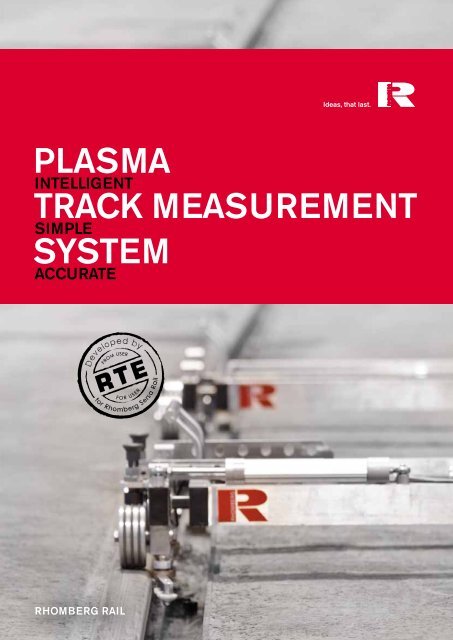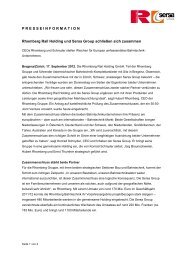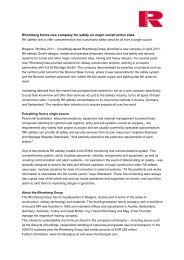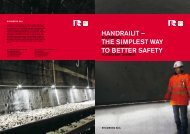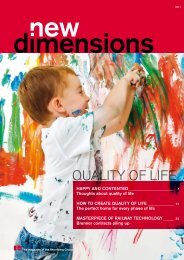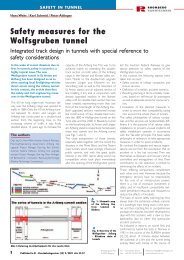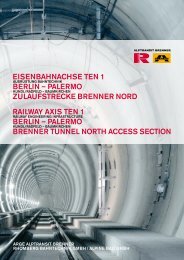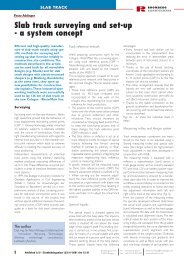Download product brochure "Plasma - Track Measurement System"
Download product brochure "Plasma - Track Measurement System"
Download product brochure "Plasma - Track Measurement System"
You also want an ePaper? Increase the reach of your titles
YUMPU automatically turns print PDFs into web optimized ePapers that Google loves.
PLASMA<br />
intelligent<br />
TRACK MEASUREMENT<br />
simple<br />
system<br />
ACCURATE<br />
RHOMBERG RAIL
PLASMA:<br />
System with<br />
Precision –<br />
simply<br />
intelligent<br />
PLASMA – A TAILOR-MADE SOLUTION FOR<br />
RAILWAY SURVEYING<br />
Modern railway engineering places high demands<br />
not only on the quality of the railway<br />
but also on the accuracy and reliability of<br />
track surveying systems. This prompted RTE<br />
Technologie GmbH to develop the PLASMA<br />
system, on behalf of Rhomberg Rail, and in<br />
close cooperation with users and customers.<br />
PLASMA is a compact, light-weight, and<br />
highly accurate instrument, based on longitudinal<br />
chord measurement. It delivers a<br />
continuous survey of rail geometry, and can<br />
be used instead of heavy and expensive<br />
track control vehicles.<br />
The system was introduced in 2001<br />
at the Cologne-Rhine/Main (Germany)<br />
high speed slab track line, for checking<br />
and correcting of the rails. Since then,<br />
PLASMA has been successfully used<br />
world-wide in a variety of projects,for<br />
ballast track, slab track, and light rail<br />
traffic.<br />
At the same time, PLASMA is constantly<br />
refined and advanced, in regards of both<br />
hardware and software, with customer<br />
requirements being the top priority.
Applications<br />
REFERENcEs<br />
MAINTENANCE OF EXISTING TRACKS<br />
The safe operation of railway lines means that continuous<br />
monitoring, maintenance and renewal of the tracks have to<br />
be carried out. The position of the track and especially the<br />
inner geometry, are an absolute necessity for safety and passenger<br />
comfort. The application of the PLASMA system is<br />
extremely efficient - even for short sections. All the relevant<br />
data concerning the track geometry can be accurately documented<br />
in its entirety.<br />
• High-speed line Cologne-Rhine/Main (Germany)<br />
• High-speed line Nuremberg-Ingolstadt (Germany)<br />
• Lötschberg base tunnel (Switzerland)<br />
• San Pedro Tunnel (Spain)<br />
• Tranvia Tramway Tenerife (Spain)<br />
• Metro Istanbul (Turkey)<br />
• Metro Caracas (Venezuela)<br />
• Citytunneln Malmö (Sweden)<br />
CONSTRUCTION AND CONTROL OF NEW LINES<br />
On new lines, particularly high-speed lines, precision (especially<br />
of the inner geometry) is of considerable importance<br />
for safety and passenger comfort. PLASMA is able to provide<br />
results with the required high accuracy in a fast and reliable<br />
way. Combined with GPS or a total station, even the deviations<br />
from the design geometry may be calculated.<br />
EXAMPLES<br />
Irrespective of whether you perform maintenance or build<br />
new lines - from tramways to high speed rail lines, PLASMA<br />
is the ideal measuring system for all of these areas of application:<br />
• Control measurements right after installation or during<br />
the course of final inspection (if required with a<br />
propelled unit)<br />
• Comparison of as-built vs. design geometry (by using<br />
existing reference points, and the inner geometry)<br />
• Offset lists for rail correction works<br />
• Provision of tamping data (for ballast track works)<br />
• Fast and flexible control measurement after local<br />
correction works<br />
Measuring principle<br />
The inner geometry of the track is continuously recorded as the<br />
PLASMA moves along the track, by measuring (at the midpoint<br />
of the chord) the distance between the chord and the rail (refer<br />
to the graphic). This method of overlapping chords is a tried<br />
and tested, widely applied measuring technique, normally used<br />
for the conventional ballast roadbed alignment. The sensor<br />
readings are recorded at a high frequency providing a seamless<br />
measurement of the track.<br />
distance between the measuring points<br />
<strong>Track</strong> axis<br />
(e.g. the rail supporting points or sleepers)<br />
Measuring principle of overlapping chords (string-lining)
System description<br />
MEASUREMENT RESULTS<br />
PLASMA is characterised by its modular and compact configuration<br />
which enables the transport, installation, and operation<br />
to be carried out by one person, providing the user with a high<br />
degree of mobility and flexibility.<br />
The system comprises three trolleys: the main, or central trolley,<br />
and two satellite trolleys. The satellites run in front of, and behind,<br />
the main trolley, respectively, and are connected by a mechanical<br />
chord (aluminum profile). The main trolley is equipped<br />
with an industrial PC and a touch screen monitor, as well as<br />
sensors for horizontal and vertical track alignment, superelevation,<br />
gauge and chainage.<br />
The front satellite is connected to the central trolley by a spacing<br />
element, at a distance that corresponds to half the chord<br />
length. The back satellite is pulled by the chord, and runs behind<br />
the central trolley. The main trolley itself is pushed by the operator<br />
along the track at walking speed. The chord can be delivered<br />
at various lengths, up to a maximum of 10m.<br />
The following parameters are measured immediately:<br />
• Horizontal and vertical versine<br />
• Super elevation<br />
• Longitudinal inclination<br />
• Gauge<br />
• Chainage<br />
The following values can be derived from the measurement data:<br />
• Horizontal and vertical curvature<br />
• Torsion<br />
• Versines for any given chord length<br />
• Horizontal and vertical offsets (for known design geometry)<br />
During operation the system displays the current sensor readings<br />
on the monitor, both in numeric format and as a multichannel<br />
diagram.<br />
By connecting the resulting track geometry to existing reference<br />
points, it is possible to evaluate the measurement within a global<br />
three-dimensional coordinate system.<br />
Horizontal versine<br />
curved track<br />
(highly exaggerated<br />
to increase clearness)<br />
chord (schematic)<br />
Schematic configuration of the PLASMA system<br />
Real-time, multi-channel measurement plot on the PLASMA touch screen
Technical Data<br />
Power supply<br />
12 V DC, Standard battery<br />
Horizontal versine Accuracy: ± 0,05 mm Measuring Range: ± 25 mm<br />
Vertical versine Accuracy: ± 0,05 mm Measuring Range: ± 10 mm<br />
Gauge Accuracy: ± 0,2 mm Measuring Range: – 40 mm to + 20 mm<br />
Superelevation Accuracy: ± 0,3 mm Measuring Range: ± 10°<br />
Chainage<br />
Accuracy: ± 10 mm<br />
Total weight<br />
Approx. 80 kg<br />
Weight of heaviest single component Approx. 35 kg<br />
Performance<br />
2-3 km per hour (walking speed)<br />
Recording rate<br />
max. 1.000Hz (corresponding to a 1mm interval at 3kph measurement speed)<br />
At a Glance – The biggest advantages<br />
of the PLASMA-System<br />
• Mobility and flexibility: All components of the measuring<br />
system can be carried by one person and fit into the trunk<br />
of a vehicle (preferably a station wagon or a van). Assembling<br />
and start up take less than 10 minutes.<br />
• Simple handling: All measurements can be easily carried<br />
out by a single person.<br />
• The system is weather-independent:<br />
- unlike survey systems which use geodetic methods<br />
- unaffected by rain, fog, or wind<br />
- no refraction influence<br />
• Automatic elimination of negative vibration influences<br />
• Mobility allows increased <strong>product</strong>ivity<br />
• Convenient operation during measurement via touch<br />
screen<br />
• High accuracy<br />
- Continuous measurements (chord overlapping)<br />
- High-precision versine sensors<br />
• User-friendly and powerful post-processing software<br />
• 3D calculation of the inner geometry, and absolute coordinates<br />
using reference points<br />
• Tailor-made presentation and documentation of the<br />
results, according to the customer requirements
Since 2001 RTE’s developments have expanded the competence<br />
profile of the Rhomberg Rail Group in the area of railway track<br />
systems and measuring technology. The team consists of a wide<br />
range of experts, which include construction engineers, surveyors,<br />
electronic engineers and software engineers. They develop and<br />
optimise complex systems for a variety of specialised disciplines.<br />
image processing, and microprocessor control systems) for<br />
outside companies. Our office in Salzburg is fully equipped with<br />
a test track and the necessary infrastructure to support CAD software<br />
and electronic developments.<br />
Marketing and sales is carried out by Rhomberg Rail Consult GmbH.<br />
The core competences of RTE Technologie GmbH are the development<br />
of track surveying systems and slab track railway systems.<br />
All these developments are characterised by their practical application<br />
as all systems have been tested and applied to in-house<br />
projects for the Rhomberg Rail Group. RTE Technologie GmbH<br />
also develops solutions in other technical areas (mechanical<br />
construction, software development, geometry tasks, digital<br />
Rhomberg Rail Consult GmbH<br />
info@rhombergrail.com<br />
Mariahilfstrasse 29<br />
6900 Bregenz/Austria<br />
Ph. +43 5574 403-0<br />
Engelbert Weiss Weg 2/B/4<br />
5020 Salzburg/Austria<br />
Ph. +43 662 421066<br />
www.rhombergrail.com


